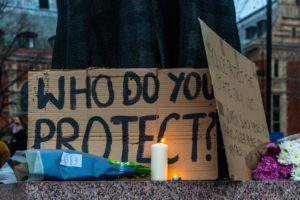The last twelve months have been individually and collectively transformative. It has been a period marred by social unrest, a public health crisis, an inept government and an ongoing environmental emergency.
But, when I look back at this period I think I will remember the isolation more than anything.
No man is an island – except this year. This year man is an island surrounded by lava.
With isolation comes loneliness and powerlessness; sometimes even thinking beyond your home becomes more and more of a mammoth task each day.
That’s why when the news broke about the disappearance of Sarah Everard and her death, at the hands of a Metropolitan police officer, it hurt so many of us, far more than we would have imagined.
A woman has been murdered, but present circumstances mean people are not allowed to mourn and pay their respects. This collective moment of distanced grieving was then further compounded by the government’s proposed policing bill, moving power into the hands of the police and limiting people’s ability to protest and organise.
“Within this huge 300-page document, individual rights are eroded”
The bill itself is gobsmacking. Within this huge 300-page document, individual rights are eroded, police powers are extended and the proposed increase in punishment reaches levels of absurdity. Some aspects of the bill have arisen as a direct result of recent protests – namely the work of Extinction Rebellion that brought London to a standstill in 2019.
The proposed bill sets parameters for protests including start and end times, noise limits and prohibits ‘causing public nuisance’. It would change the way protests would be run altogether and significantly weakens their impact.
“I wonder if it is possible that a statue of the slave owner, Edward Colston, has sufficient “emotional” value to warrant a sentence double the length of some rape charges.”
Even more shocking is the hefty new punishments attached to damage of a statue or memorial, increasing from three months to up to ten years, on the grounds that these monuments hold “emotional or symbolic value”. I wonder if it is possible that a statue of the slave owner, Edward Colston, has sufficient “emotional” value to warrant a sentence double the length of some rape charges.
Watching the events of Sarah Everard’s vigil unfold on Twitter, as attendees were aggressively arrested, I almost just accepted our fate, the proposed bill and this new society that we are being forced to live in.
Because what else could we do? We have a London Mayor incorrectly tweeting about a supposed blanket ban on protest, during the COVID-19 pandemic. A Home Secretary who condemned the Met publicly while apparently carefully directing their actions privately.
There’s a poignant lack of transparency or reliability from those who hold the most senior offices in the country, while the rest of us are stuck at home, frozen between wanting to show up and wanting to follow the rules. It can feel like we are completely powerless.
But on the evening of the 18th March 2021, as everyone sat down to have dinner and probably watch the Drag Race UK final, Peter Kyle MP confirmed that the Bill has been delayed – for almost two months, and it is not expected to look anything like it does at the moment.
Why? Largely because of individuals writing to their MPs and the work of feminist direct action group, Sisters Uncut.
“This year, they have shown what can still be achieved in isolation.”
Sisters Uncut are an organisation, founded in 2014, powered by women and gender-variant people focused on opposing the government’s cuts to services for domestic violence victims. They have led protests on red carpets, blocked bridges dyed the fountains in Trafalgar Square red and many more. But this year, they have shown what can still be achieved in isolation.
As one of the organisers of the nationwide vigils for Sarah Everard and coordinators of the protests at Scotland Yard, this particular group have been relentless in their approach. They’ve managed to mobilise the public at home through online meetings attended by thousands while incorporating social distancing into their in-person demonstrations.
It’s enough to snap you straight out of that defeatist headspace a lot of us have understandably found ourselves in.
The delay of this bill is a victory, one which has come as a direct result of the grassroots power that is still burning bright throughout this country.
While some of us may feel alienated and cut off, Sisters Uncut have shown us that we do not have to be on those individual islands at all – we just might have to look a bit harder.
“It is important to note, however, that a delay does not mean that this fight is over.”
And when you do, you will find the communities, the organisations and groups who are working tirelessly and fighting for what is right, in these almost impossible times.
It is important to note, however, that a delay does not mean that this fight is over. Sisters Uncut are still fighting to #KilltheBill in its entirety, still protesting, still working using whatever methods and resources they can.
Even in this time of extreme physical isolation, we can learn a lot from Sisters Uncut; collective power is everywhere. This successful movement to protect the right to protest shows just how important freedom to protest is.
Maddie de Ferrer
Featured image and in-article images courtesy of Gabrielle de Ferrer.

